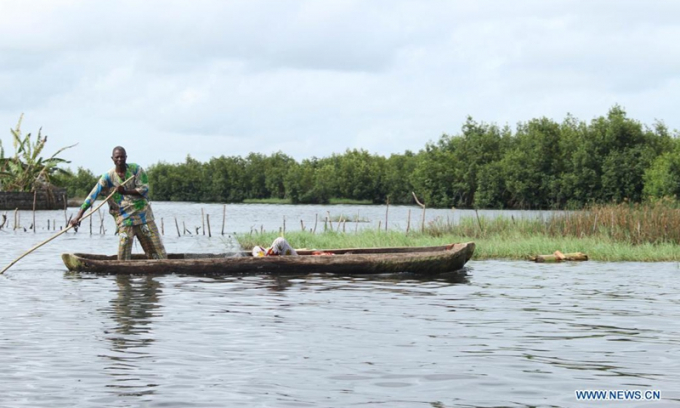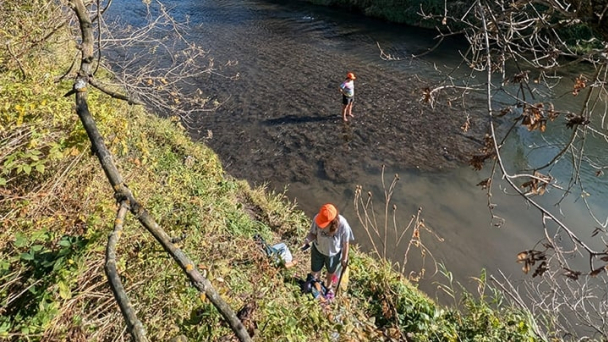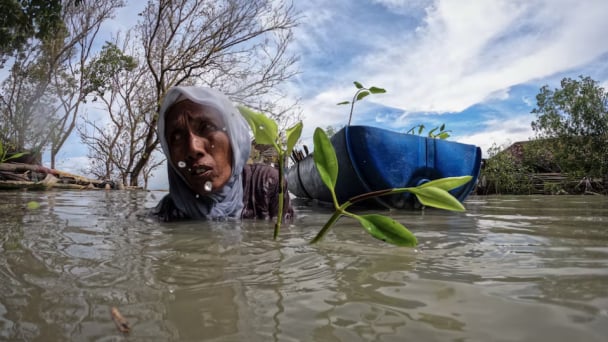May 10, 2025 | 23:06 GMT +7
May 10, 2025 | 23:06 GMT +7
Hotline: 0913.378.918
May 10, 2025 | 23:06 GMT +7
Hotline: 0913.378.918

A man rows in a flooded field in the village of Djegbadji, in Ouidah, Benin, June 21, 2021. Photo: Xinhua
In the freshwater swamp forest of Hlanzoun, southern Benin, majestic trees hum with the chirping birds and playful monkeys.
Home to once bustling flora and fauna, experts now warn that the fragile environment, one of the last of its kind in the West African country and accessible only by canoe, is at risk of disappearing.
The 3,000 hectares of forest, which takes its name from the river Hlan, is home to 241 plant and 160 animal species including the rare red-bellied monkey, the marsh mongoose and the sitatunga, a swamp-dwelling antelope.
Perched at the top of a gigantic tree squawks a hornbill, a big bird known for its long, down-curved and colorful bill, similar to toucans.
"Hornbills feed on insects and fruits. They like to follow monkeys around because they force insects to come out when they move around, making it easier for hornbills to catch," explained Vincent Romera, a French ornithologist and photographer.
With his binoculars, Romera admires a family of monkeys jumping from tree to tree, while keeping a clear distance.
"The animals here have become fearful," he says. He's considering using camera traps to try to photograph them, but also to count the forest's animal population.
"The numbers are in free-fall," he says.
Sometimes, the forest's noisy concert is interrupted by gun shots, he says, probably from poachers.
Communities living around the forest "need money, so those who can shoot go and kill animals," explained Roger Hounkanrin, a local tourist guide.
Despite steady economic growth in recent years, poverty is widespread in Benin, especially in rural areas, and 40 percent of the population lives below the poverty line according to World Bank data.
On the side of the road that lines Hlanzoun forest, lizards, crocodiles and snakes killed by hunters are sold and bought. Monkeys, too, are sometimes sold for meat.
Between 2005 and 2015, Benin's forest cover was slashed by more than 20 percent according to the World Bank, and the deforestation rate continues to be high at 2.2 percent annually.
Trees are cut down for firewood, and the fermented sap of palm trees is used to make a local alcohol, sodabi.
The damaging practice of slash and burn agriculture has also become more prevalent, warned Josea Dossou Bodjrenou, director of Nature Tropicale, a nongovernmental organization (NGO) that works on environmental issues in Benin.
"It's a poor area and we can't blame people for wanting to feed themselves," Alladatin said, urging authorities "to create conditions for alternative sources of income."
(Chinadaily)

(VAN) FAO's Director-General emphasises the need to work together to transform agrifood systems.

(VAN) Europe is facing its worst outbreak of foot-and-mouth since the start of the century.

(VAN) The central authorities, in early April, released a 10-year plan for rural vitalization.

(VAN) Viterra marked a significant milestone in its carbon measurement program in Argentina, called Ígaris, reaching 1 million soybean hectares measured.

(VAN) Minnesota study adds to growing evidence of human-accelerated erosion, which could jeopardize agriculture.

(VAN) QU Dongyu addresses International Conference of the Global Mountain Dialogue for Sustainable Development in Kyrgyzstan.

(VAN) Rising sea levels are becoming a real threat in Indonesia. On Java island, a woman keeps planting mangrove trees to protect her home from the sea.